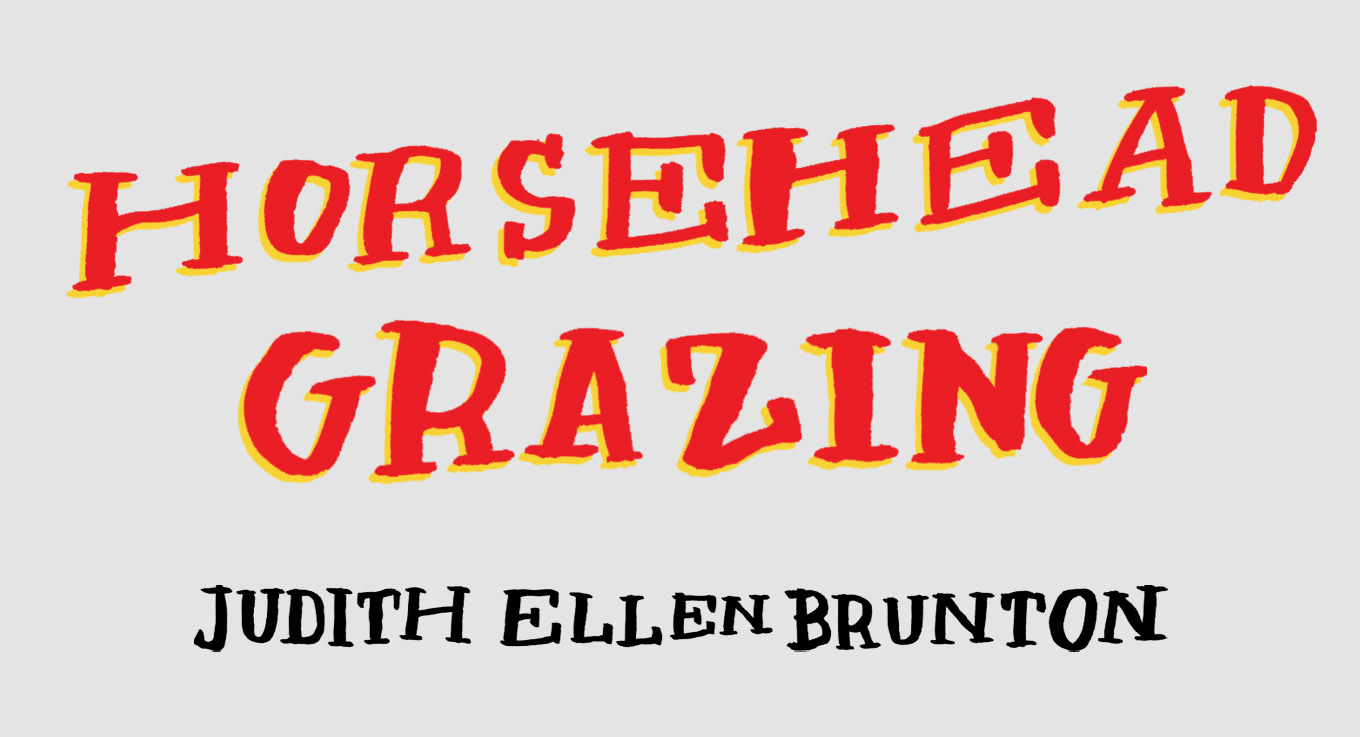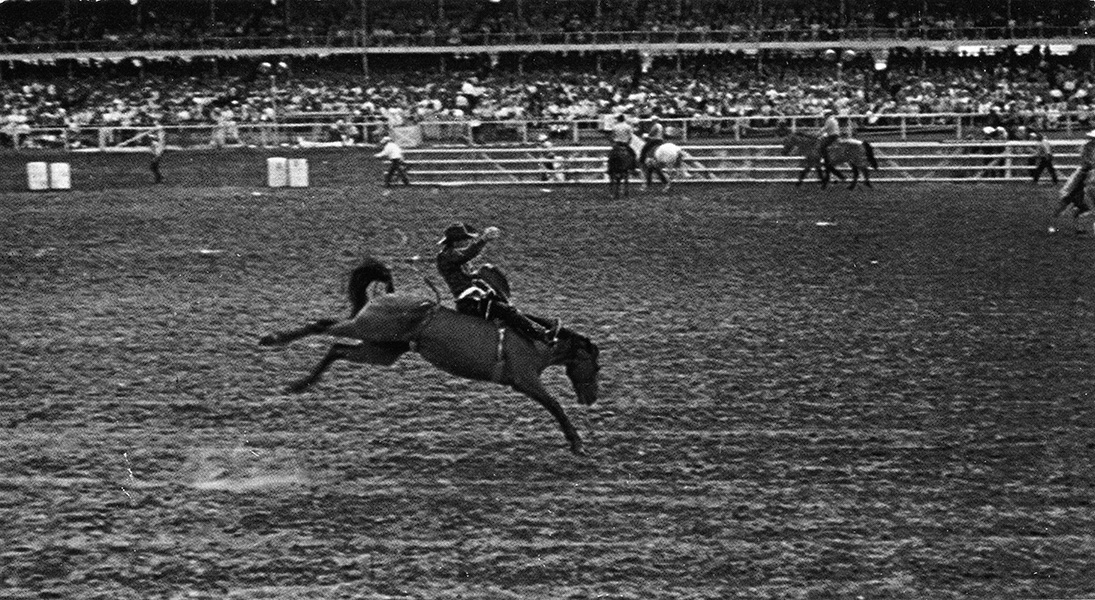



Behind the mini-donut stand, a small red pumpjack stands waist-high in a decorative lilac bush, slightly overgrowing its wooden platform. A Calgary Stampede plaque notes this horsehead pump as a historic monument, a “building block of the future.” It continues: “Visible across the plains of Alberta for most of the Twentieth Century, pump jacks have long symbolized the prosperity brought to this province by the oil and gas industry.” Oil is commemorated here as if it isn’t everywhere at the Stampede. A sleight of hand. Oil is here, in the past building the future, but it is also on the canvas tops of the chuck wagons, in the parade, in the sandstone bricks of the buildings downtown. Oil in the pancake breakfasts. This oil is not earthling, but rather a Devonian ghost with its own haunts and kin. It is a signified oil: energy, money, luck, hope. A character in a colonial marriage plot. Big Oil Stampede breakfasts are a ritual space of this oil: open doors before 8am and stretching into the night, drinking, eating, and working, dressed up business cowfolks making friends and making out, bar tab on the corporate card, nowhere to sit, seeking. Can you measure prosperity in excess? Stupid. Prosperity can’t be measured at all. It is only spent. It is only to come. Excess is the thrill and the crucible. Excess is the landman. It is surface work. Or is it subsurface work? The excess of the drunken breakfast disguises the excess of meanings. All while it extracts deep vulnerabilities, aching desire, old stories, new hopes.
Steady girl. Two drink tickets at the door for Frac juice, which is pineapple juice and enough vodka to sting. The Oxford English Dictionary does not include frack juice, but it lists fracking: hydraulic fracturing. Its juice, then, is the water, sand, and chemicals used in this extraction.
Liquid screaming into the cracks of the earth. Fracking etymology: fracturing, Latin fractūra, to break. We are drunk off breaking in the morning air. After the frac juice is gone it is time for light beers and pancakes, cruising the cruiser tables as the volume turns up. Remarking on the party I am told laughingly, fearfully, “You should have seen it before the down-turn.” This excess is not excessive enough. This boom is apparently a bust. From 1966 to 1976 a working oil rig burned in flare square on the Stampede grounds. Now the horsehead pump is put out to pasture, grazing in the lilacs. A miniature show pony. Broken in. Our prairie familiar, thirsty for a fuel that would energize a future, our present. What future is extracted now? What future can be fracked? What relationships can be built through breaking? Oil requires surface work and subsurface work. Its excesses flare at Stampede as if they aren’t everywhere. But the oil industry is a tourist, not a pilgrim to these entangled material, spiritual, and cultural rituals. Break here. Let the water of the Bow scream into the cracks. Get drunk.
Judith Ellen Brunton is a scholar of religious studies and environmental humanities trained at the University of Toronto’s Department for the Study of Religion. Her doctoral work took an ethnographic and archival approach to explore how legacies of oil extraction allow for contemporary imaginaries of the good life in Alberta. Judith Ellen is broadly interested in questions of land and labour, secularity and enchantment, religion-making, and method in the North American West. Her next projects will include investigations into ghost towns, ley lines, and—always—the rodeo.


Behind the mini-donut stand, a small red pumpjack stands waist-high in a decorative lilac bush, slightly overgrowing its wooden platform. A Calgary Stampede plaque notes this horsehead pump as a historic monument, a “building block of the future.” It continues: “Visible across the plains of Alberta for most of the Twentieth Century, pump jacks have long symbolized the prosperity brought to this province by the oil and gas industry.” Oil is commemorated here as if it isn’t everywhere at the Stampede. A sleight of hand. Oil is here, in the past building the future, but it is also on the canvas tops of the chuck wagons, in the parade, in the sandstone bricks of the buildings downtown. Oil in the pancake breakfasts. This oil is not earthling, but rather a Devonian ghost with its own haunts and kin. It is a signified oil: energy, money, luck, hope. A character in a colonial marriage plot. Big Oil Stampede breakfasts are a ritual space of this oil: open doors before 8am and stretching into the night, drinking, eating, and working, dressed up business cowfolks making friends and making out, bar tab on the corporate card, nowhere to sit, seeking. Can you measure prosperity in excess? Stupid. Prosperity can’t be measured at all. It is only spent. It is only to come. Excess is the thrill and the crucible. Excess is the landman. It is surface work. Or is it subsurface work? The excess of the drunken breakfast disguises the excess of meanings. All while it extracts deep vulnerabilities, aching desire, old stories, new hopes.
Steady girl. Two drink tickets at the door for Frac juice, which is pineapple juice and enough vodka to sting. The Oxford English Dictionary does not include frack juice, but it lists fracking: hydraulic fracturing. Its juice, then, is the water, sand, and chemicals used in this extraction.
Liquid screaming into the cracks of the earth. Fracking etymology: fracturing, Latin fractūra, to break. We are drunk off breaking in the morning air. After the frac juice is gone it is time for light beers and pancakes, cruising the cruiser tables as the volume turns up. Remarking on the party I am told laughingly, fearfully, “You should have seen it before the down-turn.” This excess is not excessive enough. This boom is apparently a bust. From 1966 to 1976 a working oil rig burned in flare square on the Stampede grounds. Now the horsehead pump is put out to pasture, grazing in the lilacs. A miniature show pony. Broken in. Our prairie familiar, thirsty for a fuel that would energize a future, our present. What future is extracted now? What future can be fracked? What relationships can be built through breaking? Oil requires surface work and subsurface work. Its excesses flare at Stampede as if they aren’t everywhere. But the oil industry is a tourist, not a pilgrim to these entangled material, spiritual, and cultural rituals. Break here. Let the water of the Bow scream into the cracks. Get drunk.

Judith Ellen Brunton is a scholar of religious studies and environmental humanities trained at the University of Toronto’s Department for the Study of Religion. Her doctoral work took an ethnographic and archival approach to explore how legacies of oil extraction allow for contemporary imaginaries of the good life in Alberta. Judith Ellen is broadly interested in questions of land and labour, secularity and enchantment, religion-making, and method in the North American West. Her next projects will include investigations into ghost towns, ley lines, and—always—the rodeo.